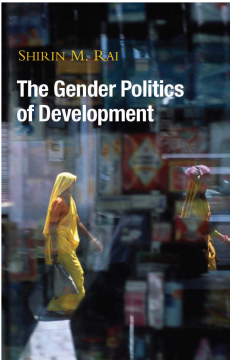
Additional Information
Book Details
Abstract
In The Gender Politics of Development Shirin Rai provides a comprehensive assessment of how gender politics has emerged and developed in post-colonial states.
In chapters on key issues of nationalism and nation-building, the third wave of democratization and globalization and governance, Rai argues that the gendered way in which nationalist statebuilding occured created deep fissures and pressures for development. She goes on to show how women have engaged with institutions of governance in developing countries, looking in particular at political participation, deliberative democracy, representation, leadership and state feminism. Through this engagement, Rai claims, vital new political spaces have been created. Though Rai focuses in-depth on how these debates have played out in India, the book's argument is highly relevant for politics across the developing world.
This is a unique and compelling synthesis of gender politics with ideas about development from an authoritative figure in the field.
Shirin Rai is Professor in the department of Politics and International Studies at the University of Warwick. Her research interests include feminist politics, democratization, globalization and development studies. Her most recent book is Gender and the Political Economy of Development (2002).
'Lucidly written, Shirin Rai’s essays in this volume are insightful contributions to recent feminist debates on democratization and globalization.'
Bina Agarwal, University of Delhi
'This rich collection is full of hope as well as despair. How should we evaluate women's increased visibility and political empowerment in the world today, when at the same time women's socio-economic marginalization continues or even increases? In this proof of her powerful scholarship, Shirin Rai combines discussions of key concepts in feminist and development studies, with studies of actual gender politics of development, from grass roots to global institutions.'
Drude Dahlerup, Stockholm University
‘The book provides an excellent and intelligent summary of the debates ... The Gender Politics of Development will no doubt be well thumbed as scholars of gender politics seek an authoritative and engaged guide to the literature . It manages to fall into that rare category of books that is theoretically astute and yet accessible to a wide readership, written with a critical mind and a passionate spirit.'
Shireen Hassim, University of the Witwatersrand
Table of Contents
| Section Title | Page | Action | Price |
|---|---|---|---|
| Contents\r | v | ||
| Acknowledgements\r | vi | ||
| Introduction: the gender politics of development\r | 1 | ||
| Organization of the book\r | 4 | ||
| 1 | Gender, nationalism and 'nation-building'\r | 10 | ||
| Gender and nationalism\r | 11 | ||
| Imaging a nation | 13 | ||
| Nationalist movements and the 'self-determination' of women\r | 30 | ||
| Codifying nationalism\r | 34 | ||
| Conclusion\r | 37 | ||
| 2 | \rWomen and the post-colonial state | 39 | ||
| Women in struggle\r | 40 | ||
| Negotiating boundaries\r | 50 | ||
| Conclusion: in and against the state?\r | 56 | ||
| 3 | Theorizing gender and democratization\r | 59 | ||
| Feminist engagements\r | 60 | ||
| Gender and democratization\r | 62 | ||
| Democratization and entitlements\r | 66 | ||
| Democratization and globalization\r | 67 | ||
| In conclusion\r | 68 | ||
| 4 | Mainstreaming gender, democratizing the state?\r | 71 | ||
| Defining issues\r | 72 | ||
| Can state institutions\rpromote women's interests? | 73 | ||
| National machineries for women\r | 78 | ||
| Democratization of the state\r | 85 | ||
| 5 | Quotas in context\r | 90 | ||
| The context\r | 92 | ||
| Quota discourses in South Asia\r | 94 | ||
| Quota provisions in local government: a comparative perspective\r | 98 | ||
| Quotas in practice: do they make a difference?\r | 102 | ||
| Conclusion\r | 109 | ||
| 6 | Globalization, development and global governance\r | 113 | ||
| Framing the global governance literature\r | 113 | ||
| Defining global governance\r | 115 | ||
| Challenges by and for feminist politics\r | 132 | ||
| 7 | Knowledge and/as power\r | 137 | ||
| Women inventors, invented stories\r | 137 | ||
| The World Trade Organization and intellectual property rights\r | 141 | ||
| Trade Related Intellectual Property rights - national and gender perspectives\r | 146 | ||
| Conclusions\r | 155 | ||
| 8 | Networking across borders\r | 157 | ||
| Agents of knowledge, knowledge as power\r | 158 | ||
| SARN as a regional network: working across political borders\r | 163 | ||
| Conclusion: understanding the politics of knowledge networks\r | 170 | ||
| Conclusion: what hopes, why despair?\r | 175 | ||
| Notes\r | 182 | ||
| Bibliography\r | 190 | ||
| Index\r | 209 |
